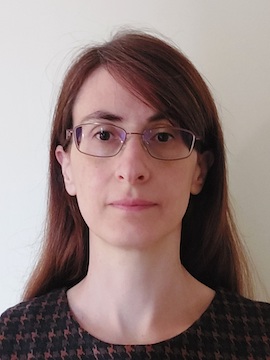Meet Our Enthusiastic, World Leading Experts
When you choose Queen Mary to pursue your postgraduate study in chemistry, you’ll benefit first-hand from the knowledge of leaders in the field who feel as passionately about teaching as they do their research. Through your seminars, learning materials and research project, you’ll experience their expertise and enthusiasm directly.
Professor Marina Resmini
Professor Marina Resmini is an award-winning Professor of Materials Chemistry and the Deputy Head of Chemistry Department. She is an internationally-recognised leading voice in her field and teaches on the Topics in Biological Chemistry module on the Chemical Research programme. As well as her teaching and research roles she is a Trustee of the Royal Society of Chemistry (RSC) and Chair of its Inclusion and Diversity committee.
Prof Resmini has a strong research interest on the development of novel functional nanomaterials with potential applications at the physical and life sciences interface; in particular the focus is on the use of chemical tools to confer special properties to materials for applications as drug delivery systems, catalysts and sensors. Her research group for example have recently started working on the development of novel sensors for the detection and quantification of key components in coffee.
In the video below, Professor Resmini speaks about teaching in Chemistry at Queen Mary University of London.
Dr Lesley Howell
 One of our Senior Lecturers, Dr Howell counts protein-protein interactions (PPIs), protein-DNA interactions and harnessing their potential as drug targets among her research interests. The postgraduate modules she teaches on are Advanced Pharmaceutical Chemistry and Drug Design and Development. She is a passionate STEM ambassador and has over 10 years’ experience in organising outreach programmes and various public engagement activities.
One of our Senior Lecturers, Dr Howell counts protein-protein interactions (PPIs), protein-DNA interactions and harnessing their potential as drug targets among her research interests. The postgraduate modules she teaches on are Advanced Pharmaceutical Chemistry and Drug Design and Development. She is a passionate STEM ambassador and has over 10 years’ experience in organising outreach programmes and various public engagement activities.
I enjoy how diverse the student population is here, the different backgrounds students have in terms of the qualifications they are coming to QMUL with and their backgrounds socially as well.
Of her teaching role, Dr Howell says: “I enjoy interacting with my students. I enjoy being able to share and impart some knowledge and hopefully inspire them. I enjoy how diverse the student population is here, the different backgrounds students have in terms of the qualifications they are coming to QMUL with and their backgrounds socially as well. I enjoy this interaction whether it’s formally in a lecture theatre, or more informally in the corridor or through general conversation. Every day is different because of that interaction with the students.”
Dr Tippu Sheriff
 Dr Sheriff is a Senior Lecturer and his research interests incorporate the modelling of small molecule activation in biological systems, specifically the catalytic activation of dioxygen and the in-situ generation of hydrogen peroxide. Dr Sheriff also actively maintains an interest in the preparation and use of modified clay catalysts as green alternatives to traditional catalysts in organic synthesis. You may find yourself working alongside him for your own research project.
Dr Sheriff is a Senior Lecturer and his research interests incorporate the modelling of small molecule activation in biological systems, specifically the catalytic activation of dioxygen and the in-situ generation of hydrogen peroxide. Dr Sheriff also actively maintains an interest in the preparation and use of modified clay catalysts as green alternatives to traditional catalysts in organic synthesis. You may find yourself working alongside him for your own research project.
Describing what he likes the most about his job, he says: “I just enjoy interacting with students. I enjoy imparting knowledge and teaching. There is pressure in terms of teaching but it is something I have got used to and I try to do a good job. Getting good student feedback is very satisfying too.”
Dr Arianna Fornili
 Dr Arianna Fornili is the Programme Director of the Artificial Intelligence for Drug Discovery MSc and a Senior Lecturer in Computational Organic Chemistry. Dr. Fornili is a former Intermediate Basic Science Research Fellow of the British Heart Foundation and joined QMUL after holding postdoctoral research associate positions at the Randall Division of Cell and Molecular Biophysics (King’s College London) and the DIBIT San Raffaele Scientific Institute in Milan. Her research group (https://afornililab.wordpress.com/) focuses on the computational modelling of protein dynamics to understand protein function, elucidate the molecular basis of disease and develop small molecules with therapeutic applications.
Dr Arianna Fornili is the Programme Director of the Artificial Intelligence for Drug Discovery MSc and a Senior Lecturer in Computational Organic Chemistry. Dr. Fornili is a former Intermediate Basic Science Research Fellow of the British Heart Foundation and joined QMUL after holding postdoctoral research associate positions at the Randall Division of Cell and Molecular Biophysics (King’s College London) and the DIBIT San Raffaele Scientific Institute in Milan. Her research group (https://afornililab.wordpress.com/) focuses on the computational modelling of protein dynamics to understand protein function, elucidate the molecular basis of disease and develop small molecules with therapeutic applications.